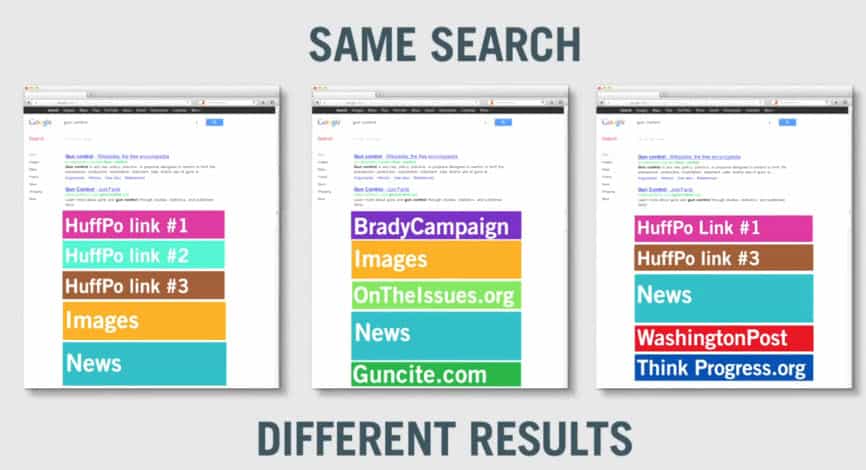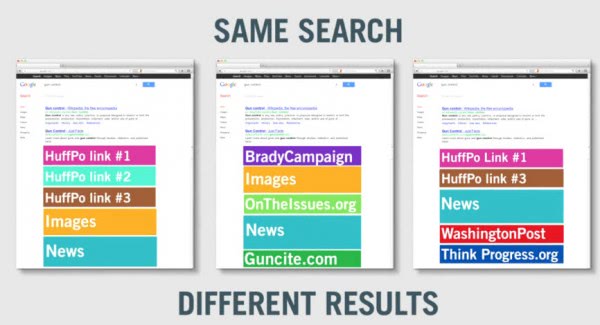Google's Filter Bubble is a scary thing

Research on the Internet can be a tricky business these days, especially if you rely on a major search engine like Google or Bing. The main reason for this is a change to personalized search results that happened in the last few years. What's bad about personalized search results you ask, a valid question. The problem is twofold. First, search engines use information they have about you, from previous searches, devices that you own, sites you like, purchases you make and every other imaginable activity to deliver personalized results to you. What this means is that you are likely to get results that you tend to agree with more than you are not.
If you are a supporter of Obama, you are likely to get pro-Obama results, if you are a conservative, you may get results from Fox News and not that many liberal news sources. While that may be reassuring for you as everyone seems to be agreeing with your point of view , it may make it more difficulty to educate yourself about a topic you are interested in.
The creators of the DuckDuckGo search engine recently ran an experiment with more than 100 participants to find out more about Google's filter bubble. For that, the company asked all participants to search for the terms gun control, Obama and abortion at the same time and make screenshots of the results.
The results show that search results are heavily personalized, both for logged in users but also for users who are not signed in to a Google account. Here is a short video that highlights the findings:
There is a second factor that may come into play. If search engines have the power to personalize search results, they may also influence your decisions based on what results they provide you with.
The reason for personalizing search results however is mundane at best: if you get results that you agree with or can relate to, you are more likely to like the search engine and keep using it in the future.
There are ways to get balanced news or information. One option is to use multiple search engines when you search on the Internet. Instead of relying solely on Google or Bing, you can use both and a third party search engine like DuckDuckGo or Yandex to diversify the search results.
What's your take on the finding?
Advertisement



















I like Jeff’s tip…. BUT don’t get carried away if you clear your browser cookies regularly! Google’s “Turn off search history personalization” page: http://support.google.com/accounts/bin/answer.py?hl=en&answer=54048 has following Note at bottom of page below “Signed out searches” section:
“Note: If you’ve disabled signed-out search history personalization, you’ll need to disable it again after clearing your browser cookies. Clearing your Google cookie clears your search settings, thereby turning history-based customizations back on.”
Great tip Jeff.
Signed out searches
If you aren’t signed in to a Google Account, your search experience will be personalized based on past search information linked to a cookie on your browser. To disable these types of personalizations, follow these steps:
Visit google.com/history/optout when not signed in to a Google Account. (If you see the Google homepage, try visiting the link again.)
On the resulting page, click Disable customizations based on search activity. (Because this preference is stored in a cookie, it’ll affect anyone else who uses the same browser and computer as you).
Solution:
https://startpage.com/
The DDG video says that Google can do this tracking even when you are not logged into Google. How do they do this assuming you have no cookies on your system? Is it by IP?
They track you by cookie
http://support.google.com/accounts/bin/answer.py?hl=en&answer=54048#signedout
I’d rather see unbiased results on any search engine. I consider I have enough brain to decide for myself what I like or dislike, what I trust or not, and I don’t need a 3rd party to “guide” me.
Related to the article, in my experience not being logged to Google coupled with not storing any cookies (and in general disabling the mostly used forms of tracking, nothing really fancy or complicated) solves the problem almost completely. Also, being on guard that this kind of filtering exists helps, because if you don’t know about it, you might be inclined to believe there is nothing else out there.
I love the personalization. If I’m researching and I want unbiased results, I’ll search anonymously.
“if you are a conservative, you may get results from Fox News and not that many liberal news sources”
In my experience, people who believe Fox News aren’t capable of grasping facts. Remember, Fox is the only news network that has ever filed (and won) a lawsuit to conform their right to make up stories from fantasy, and broadcast them as factual news.
Often, reading something you disagree with (or didn’t know yet) is much more useful and thought-provoking than reading something you fully agree with (or already did know).
These personalized results are robbing people of opportunities to enrich or change themselves, freezing them instead into what they already are.
If you assume the Web is all about change, then this approach is contrary to the spirit of the Web itself.
I’d much rather get unbiased search results, even if Google is trying to do me a favor by skewing them to match my own biases. I don’t want my search results to be an echo chamber of things I already think/feel.
You should always keep your eyes open and should be able to make up your own mind.
It also highly depends on what you are searching for if it could be a problem.
I agree with you Martin. I think personalized results make you believe in lies, the world and the internet is gigantic, if you stay on your “personalized” results you are blind. You dont want see the truth.
I understand the ‘scary’-ness part. But I also like that it’s more tailored to my viewing point.
I love personalized results. The fact that they are tailored to my interests, views, likes, means I don’t have to sift through junk.